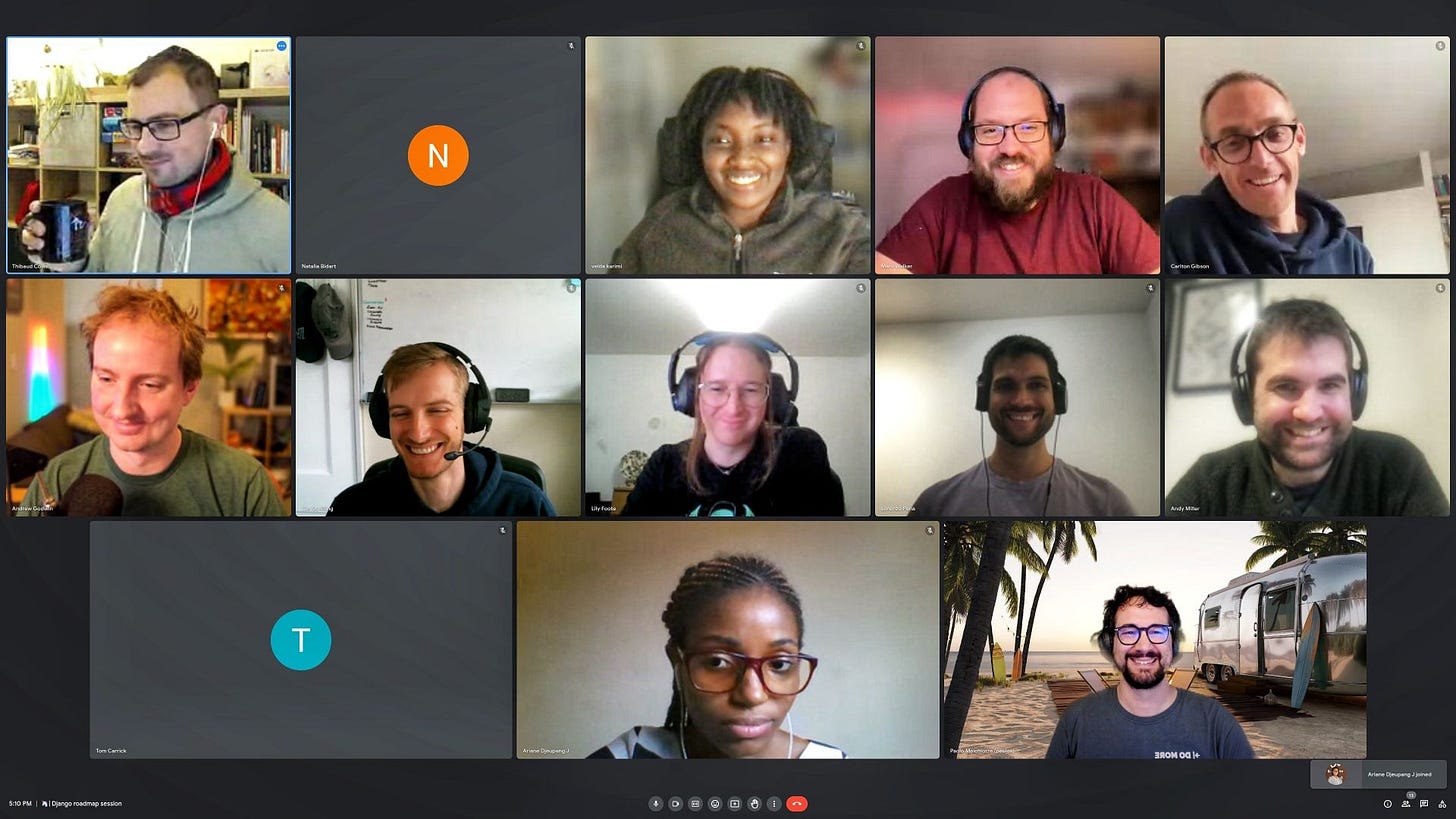Hear ye, hear ye, motley crew of marvels! What a beautiful month, filled with love, celebration of heroes, and appreciation of oneself. A new month means you get a postcard!
Being a Djangonaut is exciting. I got my first PR merged on the Django Debug Toolbar and got to chat with Tim, who is the navigator of our team, on what features he would like to see in the future implemented into the toolbar to give me an idea of what issue I would like to work on next.
I attended this week’s Django roadmap session by Thibaud, a DSF board member, to discuss and vote on ideas and features we would like to implement with next steps. It was a productive session and well executed; hats off to Thibaud. I was worried since there was a huge list of so many ideas, but we managed to go through them and have action points. To read more about the different ideas, here is a detailed document.
Jeff, a co-founder of Django Events Foundation North America (DEFNA), hosts office hours when he has time on Fridays. The office hours are a hangout where people have water cooler conversations, share their TIL's, and ask questions on Python or Django while working on their stuff. Additionally, you can also share some of the open-source projects you are working on. I got to attend one last week, which was the highlight of my week. For this particular week, Eric shared a project he built using Streamlit for comparing newsletter platforms. He also wrote an article on it to get you started.
EuroPython, the oldest and longest-running volunteer-led Python programming conference on the planet, is going to happen on the 8th and 14th of July this year in Prague, Czech Republic, both online and virtually. To be regularly updated, follow them on social media.
Some bittersweet news for the Django community: Djangosites was shut down on the 23rd of January. Djangosites is a page of websites built using Django to showcase what is possible. However, we now got built with Django, which is an upgrade in terms of design and maintenance with how to contribute guides to tutorials, among others.
Monoliths, microservices, and serverless have been on the list of hot topics when developing applications, and I like this article by Mike specifically on this topic. He breaks down all the questions, removes biases, and simplifies the concepts to one main difference. Based on the article, a monolith is tightly coupled, a microservice is loosely coupled and has high cohesion, and the abstraction of infrastructure management is what makes it serverless.
I also came across this blog post by Ned Batchelder on Big-O: How Code Slows as Data Grows. The article explains how the running time changes as the data changes. It also highlights a video of his Pycon talk in Cleveland. What I found interesting about the article is how the author takes you through Big O notation, relates the concept using beans, and shows examples of real-world tasks. Additionally, he highlights the importance of Big-O when it comes to writing efficient code that performs how you want it to and subtly warns against falling into the trap of thinking that Big-O is everything.
In your career, there comes a time when you need to level up. This article shares areas you can focus on to move up in your career. Some of the main points to focus on include: people because of impact; creating a brag document to make your work visible; taking risks; asking for forgiveness rather than permission; and stopping only giving status updates to your manager. The article is also an eye-opener for people who are also starting out.
I finally finished reading The Psychology of Money by Morgan Housel. I enjoyed this book a little more than I should have. I specifically loved the way the writer used different stories of people to bring out the points he made. The main takeaways include that money, finance, and investment are tied to our behaviors; the difference between rich and wealthy is that wealth is not visible; the role of risk and luck in investment; and the value of long tails. I highly recommend that you get around to reading it for yourself. Moreover, if you do not have the time, you can easily read a summary of the notes here. Speaking of books, if you would like to start reading books with limited time, this article is just for you. It goes through the steps the author uses to read more.
The word of the week is incipient, which describes things that are beginning or are about to become apparent. An example using a sentence: This newsletter is still in its incipient stages.
I'm making my grand departure with rose petals on the ground and gold wings on my back. My beloved mortals go forth, and may the odds ever be in your favour!








This newsletter is still in its incipient stages, and covers hot topics 👍🏻